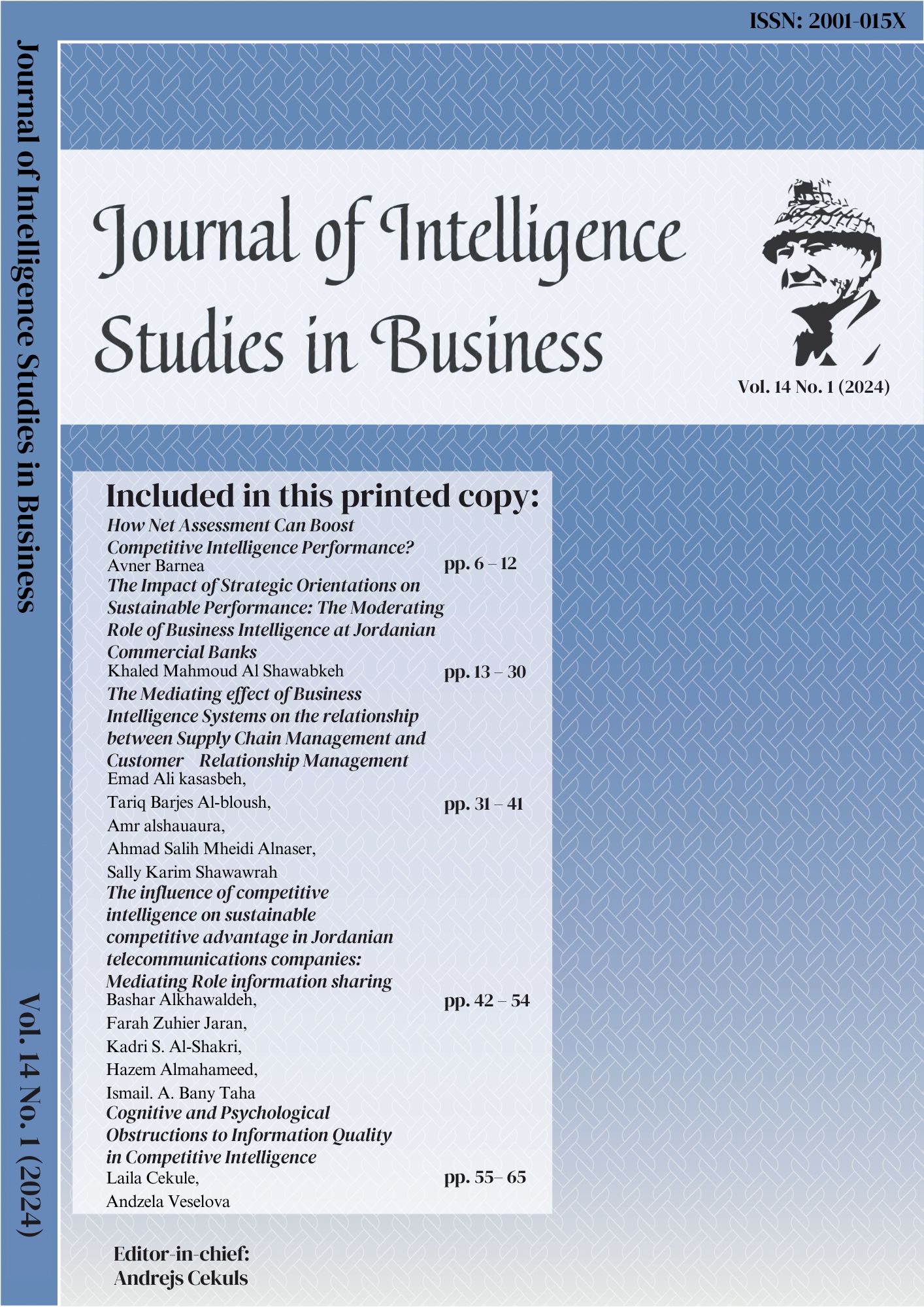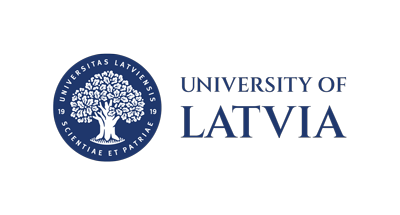Cognitive and Psychological Obstructions to Information Quality in Competitive Intelligence
DOI:
https://doi.org/10.37380/jisib.v14.i1.2489Keywords:
competitive intelligence, business psychology, information quality, information quality management, decision making; human factorsAbstract
Innovative Competitive Intelligence (CI) solutions prioritize unconventional methods to tackle emerging challenges faced by decision-makers, diverging from traditional information flow regulation. This study examines the cognitive and psychological barriers impacting the CI process in small and medium-sized enterprises, focusing on how factors such as perception, trust, and employee engagement influence information quality and CI effectiveness. By analyzing various companies, the study identifies that psychological aspects provide a nuanced understanding of information quality, considering both objective measures and subjective perceptions. Findings reveal that information quality is a subjective construct, shaped by cognitive and psychological factors, which vary among individuals. Recognizing these factors is essential for developing and curating information that meets quality expectations, thereby fostering trust and enhancing communication effectiveness. High-quality information perception can lead to superior decision-making and competitive advantage. The integration of psychological factors into information quality management is crucial for developing user-centered information systems, which improve decision-making, user engagement, and adaptability, while reducing cognitive overload and promoting trust. This comprehensive approach ensures that information systems align with users' natural processing and utilization of information, leading to improved outcomes. In small and medium-sized companies, where employees play a critical role in the initial and final stages of CI - identifying information needs and making decisions - the knowledge embedded in employees is a valuable yet underutilized resource. Through in-depth interviews, this qualitative study highlights the significance of addressing cognitive and psychological barriers to enhance CI processes, thereby optimizing information intelligence management and contributing to the economic development and sustainability of these companies.
References
Birkinshaw, J. (2022). How incumbents survive and thrive. Harvard Business Review, 100(1), 36-42.
Calof J., Breakspeare A. Competitive intelligence practices of Canadian technology firms// National Research Council, Canadian Institute of Scientific and Technical Information. Working paper. Ottawa, 1999.
Casteleiro, C., Mendes, L. (2022). Exploring the influence of quality management systems in work engagement and psychological empowerment in private institutions of social solidarity. Total quality management 33 (3), 243–277. DOI: https://doi.org/10.1080/14783363.2020.1832460
Cekuls A.. (2018). The problematic of social issues and environmental. International Multidisciplinary Scientific GeoConference Surveying Geology and Mining Ecology Management, SGEM, 18(5.3), 927–934. DOI: https://doi.org/10.5593/sgem2018/5.3/S28.118
Cekuls A.. (2019). Incentives affecting business students wish to start business. International Multidisciplinary Scientific GeoConference Surveying Geology and Mining Ecology Management, SGEM, 19(5.4), 177–182. DOI: https://doi.org/10.5593/sgem2019/5.4/S22.024
Cekuls A.. (2019). Synthesizing the understanding of sart-up from different perspectives in business learning process at university. IMCIC 2019 - 10th International Multi-Conference on Complexity, Informatics and Cybernetics, Proceedings, 2, 137–140.
Charantimath, P M. (2022). Total quality management. Pearson education; 4th Ed., p.16.
Dacula, J. C. Jr., & Gelacio, B. A. M. (2023). Application of Porter’s Five Forces in assessing the competitive advantage of the motorcycle industry. Psychology and Education Journal, 14, 213-219.
Dale, B. G., Bamford, D., Van der Wiele. (2016). Managing quality: an essential guide and resource gateway. Wiley 6th Ed., 352 p. DOI: https://doi.org/10.1002/9781119302735
Fleisher, C. S., & Bensoussan, B. E. (2007). Business and competitive analysis: Effective application of new and classic methods. FT Press.
Gilbreth, L. M. (2010). The psychology of management: the function of the mind in determining, teaching, and installing methods of least waste. Kessinger publishing, 354 p.
Halliman, C. (2001). Business Intelligence Using Smart Techniques: Environmental Scanning Using Text Mining and Competitor Analysis Using Scenarios and Manual Simulation (1st ed.). Houston: Information Uncover. ISBN 0-9674906-2-6.
Kakinohana, R.K., Pilati, R. (2023). Differences in decisions affected by cognitive biases: examining human values, need for cognition, and numeracy. Psicologia: Reflexão e Crítica . 36 (26), 1-12. DOI: https://doi.org/10.1186/s41155-023-00265-z
Krizan, L. (1999). Intelligence essentials for everyone. Joint Military Intelligence College. DOI: https://doi.org/10.21236/ADA476579
Lim, D.H., Yoon, S.W., Cho, D. (2020). Confirmation bias and irrational decision-making: implications for HRD in South Korea and other countries. Publ. Springer Nature. 235–259 DOI: https://doi.org/10.1007/978-3-030-54066-1_13
Malbašić, I., Marimon, F., Mas-Machuca, M. (2016). Is it worth having focused values? Management Decision, 54(10), 2370–2392. DOI: https://doi.org/10.1108/MD-05-2016-0282
Martin, A. P. (2002). Harnessing the power of intelligence, counterintelligence & surprise events. Professional Development Institute Press.
Mas-Machuca, M., Akhmedova, A., Marimon, F. (2018). Quality management: a compulsory requirement to achieve effectiveness. Total quality management & business excellence, 32(13), 1-20. DOI: https://doi.org/10.1080/14783363.2018.1548275
Matteucci, G., Guyoton, M., Auffret, M., Georgios Foustoukos, Petersen, C. C. H., El-Boustani, S. (2023). Cortical sensory processing across motivational states during goal-directed behavior. Neuron 110, 4176–4193. DOI: https://doi.org/10.1016/j.neuron.2022.09.032
McKnight, D. H., Choudhury, V., & Kacmar, C. (2002). Developing and validating trust measures for e-commerce: An integrative typology. Information Systems Research, 13(3), 334-359. DOI: https://doi.org/10.1287/isre.13.3.334.81
Mendes, L., Jesus, J. (2018). Influence of total quality-based human issues on organisational com-mitment. Total quality management & business excellence, 29(3-4), 260–286. DOI: https://doi.org/10.1080/14783363.2016.1180953
Mendes, L., Andrade, J., Lourenço, L. (2015). Perceived psychological empowerment and TQM-based Quality management systems: an exploratory research. Total quality management & business excellence, 28(1-2), 76-87. DOI: https://doi.org/10.1080/14783363.2015.1050166
Mihajlović, L. S., & Stanisavljević, B. (2022). Knowledge and lifelong education as a factor in the competitiveness of entrepreneurship. Knowledge: International Journal, 54(2), 321-326.
Muhammad A., S., Doe J., Smith, J. (2021). The Role of Trust in Information Quality Management: a psychological perspective. Journal of information quality and management, 5 (3), 45-62.
Rezaei, G., Mardani, A., Senin, A. A., Wong, K. Y., Sadeghi, L., Najmi, M., Shaharoun, A. M. (2016). Relationship between culture of excellence and organisational performance in Iranian manufacturing companies. Total quality management & business excellence, 1-22. DOI: https://doi.org/10.1080/14783363.2016.1168692
Savioni, L., Triberti, S., Durosini, I., Pravettoni, G. (2022). How to make big decisions: a cross-sectional study on the decision making process in life choices. Journal of current psychology, 42(18), 23 -33. DOI: https://doi.org/10.1007/s12144-022-02792-x
Segoro, W., Sari, M. P. (2017). The influence of ISO 9001 quality management system and corporate culture implementation on competitive advantage to improve company performance. International journal of economic research, 14(12), 423–429.
Shahrzadi L., Mansouri A., Alavi M., Shabani A.(2024). Causes, consequences, and strategies to deal with information overload: A scoping review. International Journal of Information Management Data Insights, 4 (2), 1-12. DOI: https://doi.org/10.1016/j.jjimei.2024.100261
Shuck, A. (2014). Human resource development practices and employee engagement: Examining the connection with employee turnover intentions. Human resource development quarterly, 25(2), 239–270. DOI: https://doi.org/10.1002/hrdq.21190
Wang K. (2020). Can AI combat cognitive capacity issues and information overload? retrieved August 11, 2024 https://oecd.ai/en/wonk/can-ai-combat-the-cognitive-capacity-issues-related-to-information-overload
Downloads
Published
Issue
Section
License
Copyright (c) 2024 Journal of Intelligence Studies in Business

This work is licensed under a Creative Commons Attribution-NonCommercial-NoDerivatives 4.0 International License.
Authors who publish with this journal agree to the following terms:
- Authors retain copyright and grant the journal right of first publication with the work simultaneously licensed under a Creative Commons Attribution License that allows others to share the work with an acknowledgement of the work's authorship and initial publication in this journal.
- Authors are able to enter into separate, additional contractual arrangements for the non-exclusive distribution of the journal's published version of the work (e.g., post it to an institutional repository or publish it in a book), with an acknowledgement of its initial publication in this journal.
- Authors are permitted and encouraged to post their work online (e.g., in institutional repositories or on their website) prior to and during the submission process, as it can lead to productive exchanges, as well as earlier and greater citation of published work (See The Effect of Open Access).








